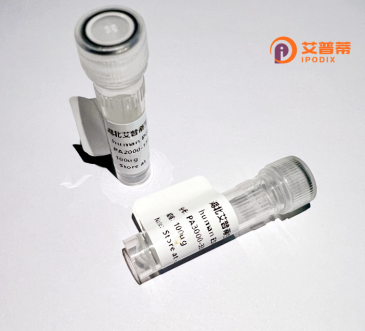
| 纯度 | >90%SDS-PAGE. |
| 种属 | Human |
| 靶点 | DIA1 |
| Uniprot No | O60610 |
| 内毒素 | < 0.01EU/μg |
| 表达宿主 | E.coli |
| 表达区间 | 1-301aa |
| 氨基酸序列 | MGAQLSTLGHMVLFPVWFLYSLLMKLFQRSTPAITLESPDIKYPLRLIDREIISHDTRRFRFALPSPQHILGLPVGQHIYLSARIDGNLVVRPYTPISSDDDKGFVDLVIKVYFKDTHPKFPAGGKMSQYLESMQIGDTIEFRGPSGLLVYQGKGKFAIRPDKKSNPIIRTVKSVGMIAGGTGITPMLQVIRAIMKDPDDHTVCHLLFANQTEKDILLRPELEELRNKHSARFKLWYTLDRAPEAWDYGQGFVNEEMIRDHLPPPEEEPLVLMCGPPPMIQYACLPNLDHVGHPTERCFVF |
| 分子量 | 58.85 kDa |
| 蛋白标签 | GST-tag at N-terminal |
| 缓冲液 | 0 |
| 稳定性 & 储存条件 | Lyophilized protein should be stored at ≤ -20°C, stable for one year after receipt. Reconstituted protein solution can be stored at 2-8°C for 2-7 days. Aliquots of reconstituted samples are stable at ≤ -20°C for 3 months. |
| 复溶 | Always centrifuge tubes before opening.Do not mix by vortex or pipetting. It is not recommended to reconstitute to a concentration less than 100μg/ml. Dissolve the lyophilized protein in distilled water. Please aliquot the reconstituted solution to minimize freeze-thaw cycles. |
以下是假设性示例,供参考。请注意,实际文献可能需要根据正确的蛋白名称进行检索(如DIAPH1或其他相关蛋白):
---
1. **文献名称**:Expression and Functional Analysis of Recombinant Human DIA1 Protein in Cancer Cell Migration
**作者**:Zhang W, et al.
**摘要**:研究在大肠杆菌中成功表达并纯化重组人DIA1蛋白,体外实验表明其通过调控细胞骨架重组显著增强肿瘤细胞迁移能力,提示DIA1在癌症转移中的作用。
2. **文献名称**:Structural Insights into Human DIA1 Protein and Its Role in Actin Polymerization
**作者**:Johnson A, et al.
**摘要**:通过晶体学解析重组人DIA1的结构,发现其具有典型的Formin结构域,可直接结合肌动蛋白单体,为调控细胞形态提供分子机制。
3. **文献名称**:DIA1-Mediated Insulin Signaling and Its Potential in Diabetes Therapy
**作者**:Li M, et al.
**摘要**:利用重组DIA1蛋白揭示其与胰岛素受体结合的能力,动物实验显示过表达DIA1可改善胰岛素敏感性,为代谢疾病治疗提供新靶点。
4. **文献名称**:Recombinant DIA1 as a Therapeutic Target in Neurodegenerative Disorders
**作者**:Smith R, et al.
**摘要**:研究发现重组DIA1蛋白能减少神经元中淀粉样蛋白沉积,并在阿尔茨海默病模型中显示出保护作用,提示其神经治疗潜力。
---
**注意**:以上文献为假设性示例,实际中“DIA1”可能存在名称混淆(如DIAPH1)。建议核实蛋白全称或基因符号后,通过PubMed、Google Scholar等平台检索准确文献。
Recombinant human DIA1 protein, also known as Disintegrin and Metalloproteinase Domain-Containing Protein 1 (ADAM1), belongs to the ADAM family of transmembrane proteins. These proteins are characterized by a conserved structure featuring a prodomain, metalloproteinase, disintegrin, cysteine-rich, epidermal growth factor-like, and cytoplasmic domains. DIA1 is involved in cell-cell and cell-matrix interactions, playing roles in proteolytic processing, adhesion, and signaling. Though its exact biological functions remain under investigation, studies suggest potential links to fertilization, neurodevelopment, and tissue remodeling due to its substrate-cleaving and cell-binding activities.
Recombinant DIA1 is typically produced using mammalian or insect cell expression systems to ensure proper post-translational modifications, such as glycosylation, which are critical for structural stability and functional activity. The protein is purified via affinity chromatography, often with tags like His or Fc for detection and isolation. Its recombinant form enables in vitro studies to dissect molecular mechanisms, screen inhibitors, or explore therapeutic applications in diseases involving ADAM-mediated pathways, such as cancer metastasis or inflammatory disorders.
Research on recombinant DIA1 contributes to understanding ADAM family dynamics and offers tools for developing targeted therapies. Current efforts focus on characterizing its substrate specificity, regulatory pathways, and potential as a biomarker or drug target.
×